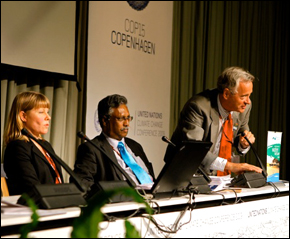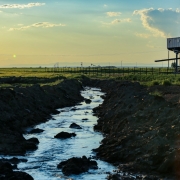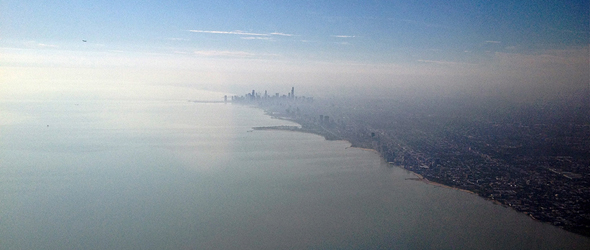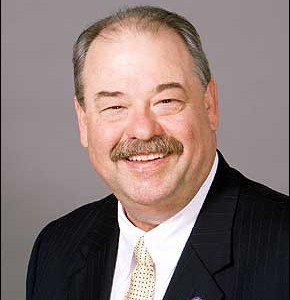Freshwater Crisis Not Included in Final Copenhagen Accord Despite Calls For Action

International climate groups band together in Copenhagen to keep water on the negotiating table.
By Andrew Maddocks
Circle of Blue
The current climate accord negotiated at the United Nations conference in Copenhagen is dangerously inadequate, asserted a team of international environmental organizations.
During a talk at the Bella Center, where the climate conference was held, the Global Water Partnership, Global Public Policy Network on Water Management, Stockholm International Water Institute, and the Stakeholder Forum teamed up to warn that stakeholders were about to make a dangerous mistake – not mentioning the freshwater crisis at all in the historic negotiating text.
As parties embraced a final climate change accord, water was included in one sentence within the latest draft of the treaty and then dropped entirely in the final text. Over the past few months, water-specific language has appeared and disappeared from drafts of the UN climate change adaptation text. In the last preliminary climate talks in Barcelona, water was eliminated from the negotiating texts.
Vulnerable People
Generations of people living in vulnerable coastal nations and farmers facing volatile rainfall could be left unprepared for decades if the treaty’s language isn’t carefully crafted into the next international climate treaty, said GPPN Secretariat Hannah Stoddart, one of the speakers at the “Bridging the Water and Climate Change Agendas” event. Presenters on the panel explored the disconnect between climate and water contingents in the build-up to COP15, and hoped to apply more pressure to integrate water into the treaty.
In Copenhagen, the GPPN and its allies tried to step up the pressure on leaders by putting water in powerful introductory videos and speeches about climate and water-related damage happening around the world.
Though representatives from the GPPN network — which includes partners from SIWI, the GWP and the World Wildlife Fund —had modest expectations for changes to the UN text, they were determined to stress the connections between water and climate change to the 33,000 accredited attendees at the conference, including more than 120 heads of state that attended the 13-day United Nations Conference on Climate Change, which ended on December 19.
Ainun Nishat, a senior climate change adviser for the International Union for the Conservation of Nature, opened the panel discussion with a quick summary of the challenges facing Bangladesh — severe weather events, rising sea levels, shifting rainfall patterns and a fragile food supply.
“I feel very ashamed the international community has not done anything about that,” Nishat said.
Demands For Recognition
Nishat gave first-hand examples that supported the GPPN’s central agenda — urgent demand for action, regional and international guidance on water-related issues and a long-term strategy for adaptation by the United Nations.
The subsequent speakers moved through a series of warnings and guidance measures for climate leaders.
Managing water resources will be critical, Stoddart said. She added that effective management requires broad-based cooperation, which starts at the international treaty level. Identifying a disconnect between climate and water advocates, speakers at the event encouraged everyone at the climate conference to break out of their specialities and engage in interdisciplinary discussions and solutions.
Other organizations like the World Water Council suggested that the Copenhagen Accord and its successor climate pacts include an international fund for water.
Many of the panel members’ goals looked beyond Copenhagen.
John Matthews of the World Wildlife Fund supervises freshwater and climate adaptation issues, and has worked with water across cities, energy sectors and fisheries. The scale of potential problems, Matthews said, will require additional resources that are better integrated amongst regions to local institutions. He highlighted transboundary rivers, such as the Rio Grande, which crosses from the U.S. into Mexico, as a key area to bridge both organizations as well as water issues such as mitigation and adaptation to find comprehensive, exemplary solutions.
Treaty Language Neglected
After the prepared speeches, moderator Mike Muller, Special Advisor to the Global Water Partnership opened the floor for questions, which revealed urgent calls for amended treaty language, all of which were subsequently ignored in the final accord. Negotiators in the room anticipated that water might be left out because environmental ministers, rather than water administrators, usually handle these agreements.
But the sense of urgency and pressure for ongoing planning are strong. Environmental ministers from both South Africa and Uganda who attended the event said they would take these messages back to their private delegation meetings.
“We really have to understand water is a key element for the poor and vulnerable,” said Karin Lexen, a project director with the Stockholm International Water Institute (SIWI). “If you talk to a woman in Mali, the first thing she will probably ask for is water. That’s why we have a commitment to trying to do our best.”
Aubrey Parker, a reporter for Circle of Blue, contributed to this report. Andrew Maddocks, a contributing writer for Circle of Blue, can be reached at circleofblue.org/contact. Follow more of Circle of Blue’s Copenhagen coverage here.
The original version of this article incorrectly identified the moderator as Felix Dodds, who was replaced with Mike Muller due to illness. This article has since been corrected.
is a Washington, D.C–based correspondent for Circle of Blue. He graduated from DePauw University as a Media Fellow with a B.A. in Conflict Studies. He co-writes The Stream, a daily summary of global water news.









Please note the following correction: in the 3rd to last paragraph, the moderator is incorrectly identified. Because of illness, Felix Dodds was replaced by Mike Muller, Special Advisor to the Global Water Partnership. He is in the photo, far right.
Steven Downey, Head of Communications, Global Water Partnership